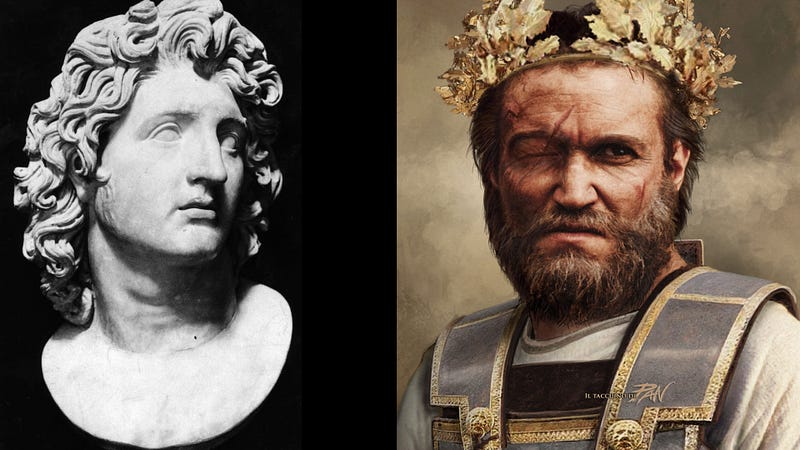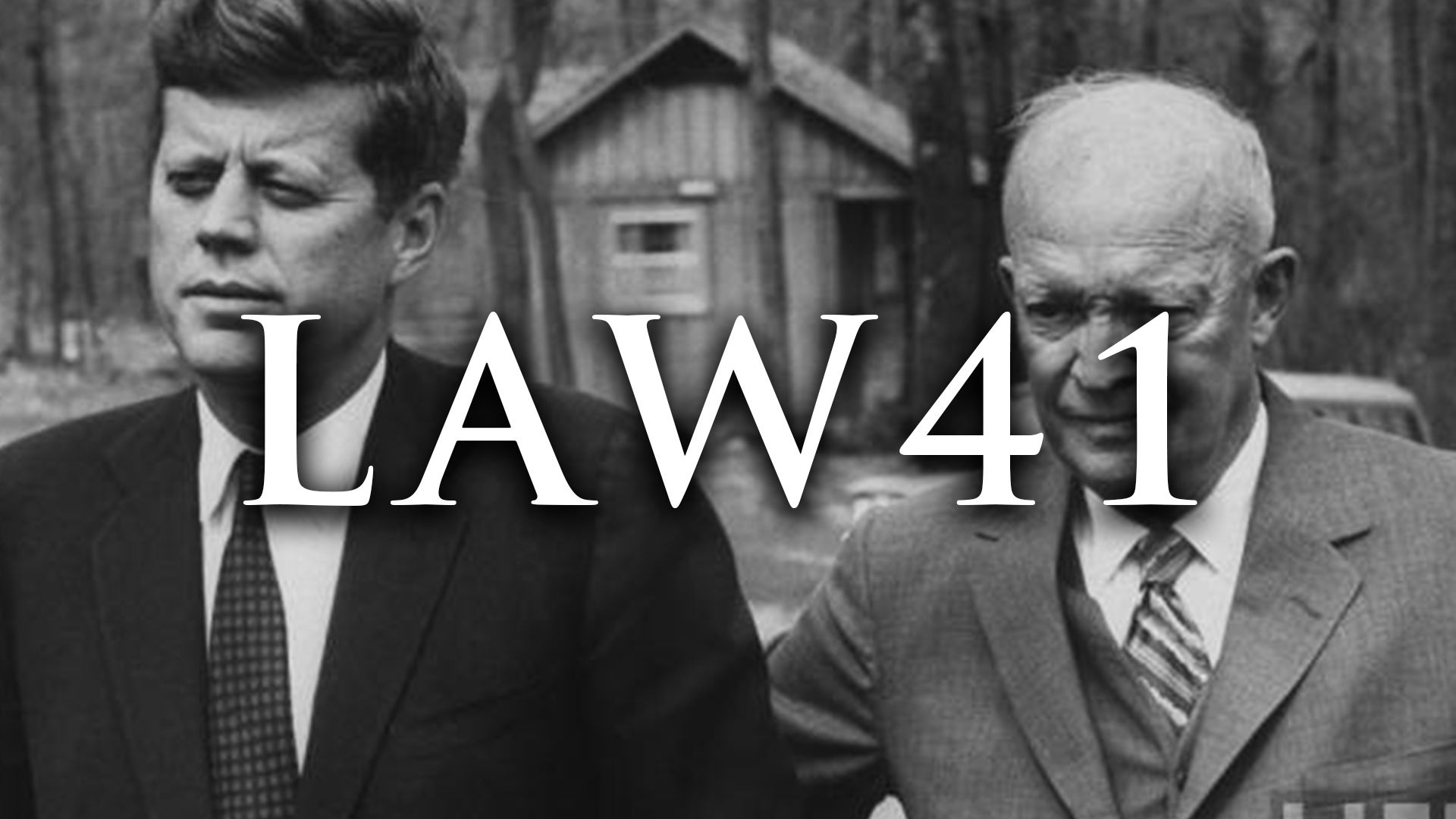Judgement
“What happens first always appears better and more original than what comes after. If you succeed a great man or have a famous parent, you will have to accomplish double their achievements to outshine them. Do not get lost in their shadow, or stuck in a past not of your own making: Establish your own name and identity by changing course. Slay the overbearing father, disparage his legacy, and gain power by shining in your own way.”

Observance of the Law
“Alexander the Great had an intense dislike for his father, King Philip of Macedonia. He hated Philip’s cunning, cautious style of ruling, his bombastic speeches, his drinking, and whoring, and other wastes of time he had preoccupied himself with. Alexander knew that he had to make himself the very opposite of his domineering father. He would force himself to be bold and reckless. He would control his tongue and be a man of few words, and he would not lose precious time in pursuit of pleasures that brought no glory. Alexander also resented the fact that Philip had conquered most of Greece. “My father will go on conquering until there is nothing extraordinary left for me to do,” he once complained.

While other sons of powerful men were content to inherit wealth and live a life of leisure, Alexander wanted only to outdo his father, to obliterate Philip’s name from history by surpassing his accomplishments. Over the years, Alexander’s defiance of his father grew bolder and bolder. One day, the two men held a heated argument before an entire court. Philip drew his sword as if to strike his son. Having drunk too much, though, the king stumbled. Alexander pointed at his father and jeered, “Men of Macedonia, see there the man who is preparing to pass from Europe to Asia. He cannot pass from one table to another without falling.”

When Alexander was 18, a disgruntled courtier murdered his father, Philip.

Philip’s previous advisors counseled Alexander, who is now the king, to proceed cautiously and do as Philip has done, conquer through cunning. But Alexander would do things his way. Alexander had reunited the Greek empire with brutal efficiency, and then he set his eyes on Persia, the prize that had eluded his father. If he defeated the Persians, Alexander would finally surpass Philip in his glory and fame.
Alexander crossed into Asia with 35,000 men to face a Persian army numbering in over a million. Before engaging the Persians in battle, he passed through the town of Gordium. Here in this town there stood an ancient chariot tied with cords made of the rind of a cornel tree. Legend had it that any man who could undo these cords, the Gordion knot would rule the world. Many had tried to untie the enormous and intricate knot but none had succeeded. Alexander, seeing he could not possibly untie the knot with his bare hands, took out his sword and with one slash cut it in half. This symbolic gesture showed the world that he would not do as others but would blaze his own path.

Against astounding odds, Alexander conquered the Persians. Most expected him to stop there, it was a great triumph, enough to secure his fame in eternity forever. But Alexander had the same relationship to his own deeds as had to his father. His conquest of Persia represented the past and he wanted never to rest in the past triumphs or to allow the past to outshine the present. He moved on to India, extending his empire beyond all known limits.

Interpretation
Above summarizes an incredible story by an incredible leader, and an incredible man. There are so many lessons to be learned from Alexander the Great; he carved his own path through the motivation to outshine the greatness of his father.
“But Alexander represents an extremely uncommon type in history. The reason this type is uncommon is simple. The father most often manages to amass his fortune, his kingdom because he begins with little or nothing. A desperate urge impels him to succeed. He has nothing to lose by cunning and impetuousness. And he has no famous father of his own to compete against. This kind of man has reason to believe in himself, to believe that his way of doing things is the best because, after all, it worked for him.”
And this feels like what I’m trying to do with myself. I don’t have famous parents. I don’t have a grand legacy to continue. There is nothing historically notable in my immediate family that motivates me to be different like Alexander the Great was. But instead, I feel pressured to create because when you type my name in Google, when you type my family name in Google through the online history archives, what comes up? This is not to say that I’m not proud of what my family has done, but it is to say that I am not content with it. I want to create as Alexander the Great did, a legacy. But unlike Alexander, I’m not trying to surpass my parental figure’s accomplishments. Instead, I’m trying to carve my own through the empty space.

But it’s a very interesting thought to entertain for anyone in my position who wants to create greatness. Well, what if I do it? What if I actually make it (whatever making it means), and I end up having a son or daughter one day? How will he navigate around the success that I have created? Because no doubt there are celebrities, musicians, Nobel Peace Prize winners, etc, that have achieved incredible accomplishments and they eventually have children. And these children now have to carve their own lane or live up to their parents greatness and climb that mountain.
“When a man like this has a son he becomes domineering, oppressive, imposing his lessons on the son who is starting off life in circumstances totally different from those in which the father himself began. Instead of allowing the son to go in a new direction, the father will try to put him in his own shoes, perhaps secretly wishing the boy will fail.”
“But, if you happen to be in the situation of living up to your parents’ greatness, you will never be able to step out of your father’s shadow until you adopt the ruthless strategy of Alexander. Disparage the past, create your own kingdom. Put the father in the shadows, instead of letting him do the same to you. If you cannot materially start from ground zero, it would be foolish to renounce an inheritance. You can at least begin from ground zero psychologically by throwing off the weight of the past and charting a new direction.Alexander instinctively recognized that privileges of birth are impediments to power. Be merciless with the past, then not only with your father and his father, but with your own early achievements. Only the weak rest on their laurels and dote on past triumphs. And, again, with power there is never time to rest.”
Keys to Power
“The ambivalent hostile attitude towards the king or father figure also finds expression in legends of heroes who did not know their father. We see this in figures like Hercules, who had no earthly father but he was the son of the god Zeus.

Later in his life, Alexander the Great spread the story that the god, Jupiter Ammon, had sired him not Philip of Macedon. Legends and rituals like these eliminate the human father because he symbolized the destructive power of the past.
“Power depends on the ability to fill a void, to occupy a field that has been cleared of the dead weight of the past. Only after the father figure has been properly done away with will you have the necessary space to create and establish a new order.”
A more recent example in the last century that symbolizes this law uses, John F. Kennedy, the 35th President of the United States.
“Kennedy knew the dangers of getting lost in the past. He radically distinguished his presidency from the past of his predecessor, Dwight D. Eisenhower. Kennedy, for instance, would not play the dull and fatherly game of golf, a symbol of retirement privilege and Eisenhower’s passion.

Instead, he played football on the White House lawn. And every aspect of his administration represented vigor and youth as opposed to the stodgy Eisenhower. Kennedy had discovered an old truth. The young are easily set against the old, since they yearn to make their own place in the world and resent the shadow of their fathers.


Another recent example from World War II:
“General Douglas MacArthur assumed command of the American Forces in the Philippines during World War II, and his assistant handed him this book containing the various precedents and protocols established by commanders before him, the methods that had been successful for them. MacArthur asked the assistant how many copies were there of this book? The assistant replied, “Six.” “Well,” the General replied, “You get all those six copies together and burn them. Everyone of them. I’ll not be bound by precedents. Anytime a problem comes up, I’ll make the decision at once, immediately.” Adopt this ruthless strategy toward the past. Burn all the books and train yourself to react to circumstances as they happen.”

This makes me think, well, what does this mean? That we don’t plan things? That we don’t ever think before something happens? I don’t think Greene means to go to that extreme. However he is most likely trying to get the message across to not commit so steadfastly to any protocols of the past. Instead, to open up more freely to present options that you wouldn’t have ordinarily seen.

“You must be prepared to return to square one psychologically rather than growing fat and lazy with prosperity.”
“Pablo Picasso could deal with success but only by constantly changing the style of his paintings, often breaking completely with what had made him successful before. How often our early triumphs turn us into a kind of caricature of ourselves. Powerful people recognize these traps. Like Alexander the Great, they strove constantly to recreate themselves. The father must not be allowed to return. He must be slain at every step of the way.”

Maybe you don’t have to live up to your actual ‘father’, but now the father is symbolic of your previous accomplishments, of your previous methods. It’s about slaying those previous ideas of who you were and re-creating yourself to suit the present better.
Just like this channel right here, what you’re watching and listening to right here. That will have to be slain. It obviously doesn’t mean I’m going to delete all my videos. No. I don’t mean it so literally. I mean it in the sense I’m going to have to recreate myself constantly, adapting, creating more unique creatives to the [inaudible 00:12:38] of the time, or rather to reflect the [inaudible 00:12:41]. I will not be doing book summaries forever. I will not be animating forever. You’re going to see new things. I’m going to be adapting. Changing. Slaying the previous accomplishments and recreating.
Reversal
“The past often has elements worth appropriating, qualities that would be foolish to reject out of a need to distinguish yourself. Even Alexander the Great recognized and was influenced by his father’s skill in organizing an army. Making a display of doing things differently from your predecessors can make you seem childish and, in fact, out of control, unless your actions have a logic of their own”
I would add on to it, unless, they actually work and they produce results.
“Finally, it is often wise to keep an eye on the young, your future rivals in power. Just as you tried to rid yourself of your father, they will soon play the same trick on you, denigrating everything you have accomplished.”
